 |
Vasily TolmanovVasily is finishing his Master’s degree at the department of cryolithology and glaciology, Geographical faculty, Moscow State University. He joined the department when he was undergraduate. Vasily got his interest in permafrost processes from the 3rd year project, where he studied variability of the active layer thickness and thaw subsidence in the Norilsk region. His current research focused on dynamics of cryogenic processes (mainly thermal erosion on Tazovskiy peninsula) and improvement of field monitoring methods. He spent 4 full field seasons in the Arctic: was an assistant manager in the International Arctic Field Courses (2017) and Cryolithological field courses (2016-2018) for 2nd year students in West Siberia, participated in the CALM works in Alaska (2018-2019), Norilsk (2016-2019), Salekhard (2016-2018) etc. He has various interests including permafrost monitoring and dynamics, periglacial geomorphology, engineering geocryology. |
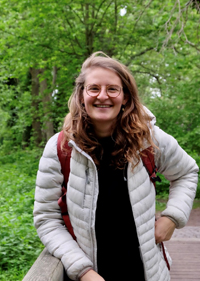 |
Charlotte HaugkCharlotte is recently graduated Masters student at the University of Potsdam, Germany. When attending a permafrost course at UNiS in Svalbard her interest for permafrost science was initially sparked and she has been passionate about it ever since. She did her thesis at AWI on organic matter characteristics of permafrost and implications for the nearshore biogeochemistry at the land to ocean interface in the Lena Delta. After her masters she will continue investigating biogeochemical properties of permafrost with a PhD at Stockholm University about mercury release from thawing permafrost. Charlotte has been involved in several science communication projects such as co-organizing workshops series “Make permafrost great again” for high school students and co-managing the social media activity of the Nunataryuk project. |
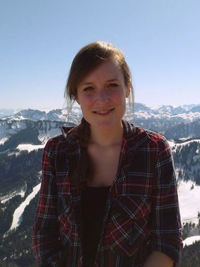 |
Juditha SchmidtJuditha is a PhD student at the Department of Geosciences, University of Oslo since 2019. Her research interest concerns permafrost in steep rock walls including the influence of radiative forcing on rock surface temperatures and slope stability under degrading permafrost. Her field work focusses on rock walls in Southern and Northern Norway as well as coastal cliffs in Svalbard. Juditha joined PYRN in 2019. |
 |
Zhenming WuZhenming is a PhD student at Department of Meteorology, University of Reading. His research is focusing on Arctic permafrost change monitoring with interferometric SAR and greenhouse gases emission modelling. He has got rich fieldwork experience in the Tibetan permafrost region from his master project at the University of Chinese Academy of Science which includes monthly soil sampling and surface elevation monitoring with levelling, as well as deep boreholes drilling for permafrost thermal condition monitoring. He is also planning more than three times fieldwork in Sweden permafrost area during a whole thawing period, in order to obtain key parameters related to greenhouse gases emission. |
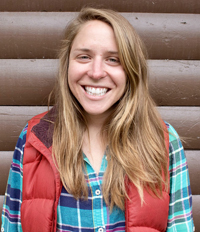 |
Lara Hughes-AllenLara Hughes-Allen, originally from California, is currently a PhD student in geoscience at Université Paris Sud. Her thesis focuses on the dynamics between permafrost and greenhouse gas emissions from thaw lakes in eastern Siberia, Russia. Lara has always had a passion for the mountains and arctic environments. She spent the last five summers working with the Juneau Icefield Research Program in Southeast Alaska as geomatics faculty and field safety staff where she helped undergraduate students develop glaciological research questions, carry out field measurements, analyze data, and present their research. Lara’s goal as a researcher is to conduct meaninful and productive Arctic research that will increase our understanding of the dynamic processes at work in these environments and help focus mitigation efforts. |
 |
Costanza MorinoCostanza Morino is a postdoctoral researcher with the CNRS (Centre National de Recherche Scientifique) and works at the Laboratoire EDYTEM within the Université Savoie Mont Blanc, France. Her academic interest focusses on rapid mass movements in glacial and periglacial environments. Her research aims at investigating the impact of permafrost degradation on the morphology and dynamic of mass wasting processes, using field and geospatial analysis. |
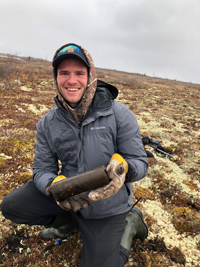 |
Adam KirkwoodAdam is a first year PhD student at Laurentian University, Canada, in the Boreal Ecology program. His PhD research is focussed on the transition of permafrost zones from continuous to discontinuous in the Hudson Bay Lowlands, the world’s second largest northern peatland. His PhD research will also investigate the concentrations of mercury stored in permafrost, the potential for it to be methylated via soil microorganisms, and the transport of this mercury through degrading permafrost environments. His PhD research will include work with remote sensing techniques, geotechnical investigation, geomorphological evolution of permafrost features, and mercury biogeochemistry associated with thawing permafrost. Adam’s M.Sc. work focussed on the microbial mediation of greenhouse gases from thawing permafrost, and the role of permafrost thaw in influencing peat chemistry and microbial communities. Adam is passionate about northern research and enjoys field work and working with northern communities, as well as networking with fellow permafrost researchers. |
 |
Niek SpeetjensNiek is currently working within the H2020 project 'Nunataryuk' (https://nunataryuk.org/about). Nunataryuk addresses issues related to arctic change and permafrost thaw from both the natural science and socioeconomic perspective - My research focuses on organic matter (OM) dynamics and carbon cycling in arctic permafrost watersheds. I combine field research, biogeochemical analyses and spatial modelling to investigate lateral OM fluxes in these aquatic systems on a pan-arctic scale. |
 |
Filip HrbáčekFilip Hrbáček is a researcher at the Masaryk University in Brno, Czech Republic. In 2017, he finished his PhD thesis focused on spatio-temporal variability of active layer thermal and physical properties in the northern part of Antarctic Peninsula region. During his career he participated in five Czech Antarctic expeditions to James Ross Island as field assistant and later as a researcher. He is PYRN member since EUCOP 2014, PYRN national representative of Czech Republic since 2016. |
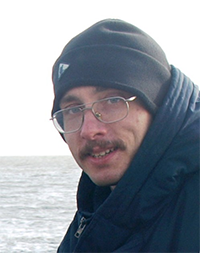 |
Denis FrolovDenis is a research fellow in the laboratory of avalanches and mudflows at Faculty of Geography, Lomonosov Moscow State University. His research interests include snow cover and climatic spacial and time alterations as well as regularities of snow cover formation and the processes of heat and mass transport in snow cover and on the boundary with ground while ground freezing.Participated in expeditions to Caucasus, New Siberian islands and other parts of Russian Arctic. He is a webmaster of the new PYRN website. |
